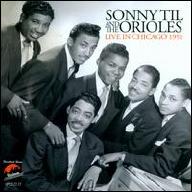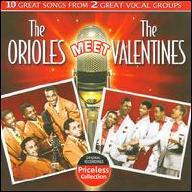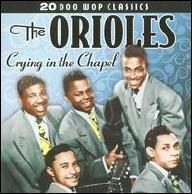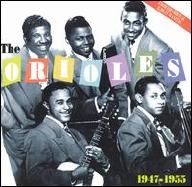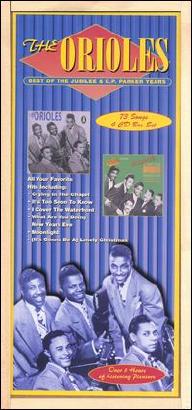Based in Baltimore, Maryland, the Orioles consisted of lead vocalist Sonny Til, Alexander Sharp (tenor vocals), George Nelson (baritone vocals), Johnny Reed (bass vocals), and guitarist Tommy Gaither. Originally called the Vibranaires, the group formed when its members were teenagers. They came to the attention of Deborah Chessler, a local merchant who also wrote songs; she would write many of the group's subsequent hits. Chessler became the band's manager and she was able to get the Vibranaires a spot on Arthur Godfrey's Talent Scouts television show. Although the group lost to pianist George Shearing, they caught the eye of Jerry Blaine, a New York record company executive, while they were in town for the program.
Blaine signed the group to his newly created It's a Natural record label and had the band cut "It's Too Soon to Know," a ballad written by Chessler. After they signed their deal with It's a Natural, the band changed its name to the Orioles. In the late summer of 1948, "It's Too Soon to Know" was released on that label, but shortly after the single's release, National Records complained about the name of Blaine's new label, so he re-released the song on Jubilee Records, a label he'd previously used to release Yiddish comedy records. "It's Too Soon to Know" became a number one R&B hit and crossed over to number 13 on the pop charts. At the time of its release, no Black group had managed to cross over to the pop charts with what was then known as a "race" record. The Orioles immediately followed the success of their debut single with the seasonal "(It's Gonna Be A) Lonely Christmas," which reached the R&B Top Ten at the end of 1948.
"Tell Me So" became the Orioles' second number one R&B hit in the spring of 1949, beginning a streak of six R&B hit singles that year. In addition to "Tell Me So," the group charted with "A Kiss and a Rose" (number 12, late summer), "I Challenge Your Kiss" (number 11, fall), "Forgive and Forget" (number five, fall), a re-released "(It's Gonna Be A) Lonely Christmas" (number five, winter), and the B-side of "Lonely Christmas," "What Are You Doing New Year's Eve" (number nine, winter).
Following their peak year of 1949, the group ran into tragedy. In 1950, Gaither, Nelson, and Reed suffered an automobile accident that killed Gaither and severely injured the other two members; Nelson quit the group later in the year. As Reed recovered, the group found replacements for Gaither and Nelson, finally settling on guitarist Ralph Williams and vocalist Gregory Carroll. The new lineup of the band had its first hit in 1952, when "Baby Please Don't Go" reached number eight on the R&B charts. The following year, the group had their biggest hit with "Crying in the Chapel." Released in the summer of 1953, "Crying in the Chapel" spent five weeks on the R&B charts and reached number 11 on the pop charts, eventually going gold; Elvis Presley had a hit with the song 12 years later. Toward the end of the year, the group had another Top Ten R&B hit with "In the Mission of St. Augustine." The single would turn out to be their last hit.
In 1954, the Orioles began to splinter, as Sharp and Reed left to join the Ink Spots. Til assembled a new lineup, but the group didn't get much attention. He continued to lead various incarnations of the Orioles, performing concerts and re-recording the group's old hits, until his death in 1981. Nelson died sometime in 1959 and Sharp died in the early '70s. In 1995, 40 years after the original lineup of the group disbanded, the Orioles were inducted into the Rock & Roll Hall of Fame. ~ Stephen Thomas Erlewine, Rovi



